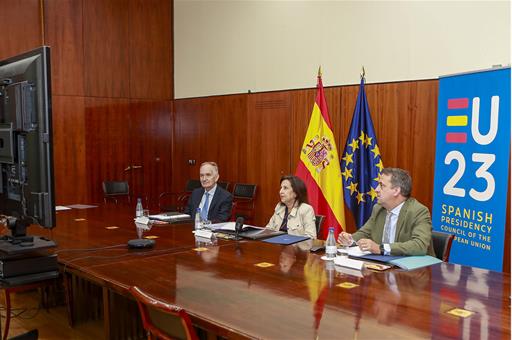In the European Parliament, Robles explains the defence priorities of the Spanish presidency of the EU
News - 2023.9.18
The acting Minister for Defence, Margarita Robles, has appeared by videoconference before the European Parliament's Subcommittee on Security and Defence in Brussels, to explain the priorities of her portfolio during the Spanish presidency of the Council of the European Union in the second half of this year.
The minister pointed out that Spain has set itself the objectives of "reinforcing Europe's capacity to protect our citizens" and "projecting security in our environment, through the promotion of the values that the EU represents", which must be offered abroad in order to contribute to global security.
To this end, Robles stressed that it is essential to reinforce unity among all members, the main driving force behind the construction of Europe, and in this respect she referred to the "great unity and determination shown by the EU in its support for Ukraine and in its unreserved condemnation of Russian President Putin".
In her presentation to the MEPs, the minister explained that the reference framework in which Spain is working is the development of the Strategic Compass, "an unprecedented milestone in the process of European integration in the area of security and defence", based on four pillars: act, protect, invest and partnerships.
This strategic document aims to "strengthen the capacity and willingness to act together to protect our interests and defend our values", said Robles, and addresses, among other issues, the EU's capacity to act autonomously, maintain a 360-degree geographical focus "in the face of threats, avoiding focusing on a single region", and strengthen the industrial and technological base of defence.
Rapid-acting capacity
The minister said that in order to improve European autonomy, the "Rapid Reaction Capability" is being developed, with up to 5,000 troops, to which Spain is making a significant contribution. The first LIVEX exercise of the new deployment capability will take place in October in Cadiz.
She also indicated that she is proposing "the reinforcement of common financing of operations and missions from the 'European Peace Facility', which has proved to be a very useful tool in aid to Ukraine but which "must not forget its original objectives, among which aid to Africa was one of the most important.
"The common security and defence policy must be and is part of the European Union's integrated approach to conflicts and crises, which requires greater solidarity and commitment from member states," the minister said.
Robles also spoke of the need "not only to invest more in defence, but to do it better", guaranteeing the coherence of all initiatives, in order to develop a stronger EU.
Among the lines of action of the Spanish mandate in the EU presidency is that of "guaranteeing access to global common spaces", and she referred to the conclusions of the Second SATCEN (EU Satellite Centre) Ministerial Meeting at its headquarters in Torrejón de Ardoz, Madrid, on 29 August, to "identify the capabilities needed to react better and faster to crises" in space.
Strengthening joint and coordinated action in cyberspace and the fight against disinformation in this increasingly relevant framework is another of Spain's areas of work in the EU.
Robles also stressed the importance of the Indo-Pacific area and the Gulf of Guinea for Europe, which is why the Action Plan of the new Maritime Security Strategy is being promoted. She referred in particular to the Sahel area, "an area of priority interest for the EU, the new advanced border of the Union".
In addition, the Minister for Defence pointed out that another priority is "making progress on the Union's future agenda", which also involves the challenge of climate change in the field of defence.
In particular, she highlighted the importance of promoting the 'Women, Peace and Security' agenda, emphasising that "the world's conflicts will not be resolved without the greater participation of women". It is therefore crucial for the EU to incorporate a sex-based perspective in its missions and to work on the future of girls who, along with boys, are the main victims of conflict.
Robles recalled the dramatic situation in Afghanistan and stated that "we cannot look the other way in the face of the situation of Afghan women and girls, who have been deprived of all rights and, above all, of education".
Finally, the Minister for Defence stressed that the idea of Europe's autonomy is fundamental, but must be "complemented by the role of NATO", which reinforces the common security and defence policy and makes the union stronger.
"It is essential that we keep in mind the strengthening of the EU to help strengthen NATO as well and that NATO in some way strengthens the EU, achieving a more balanced burden-sharing in the transatlantic link," she said.
Non official translation





